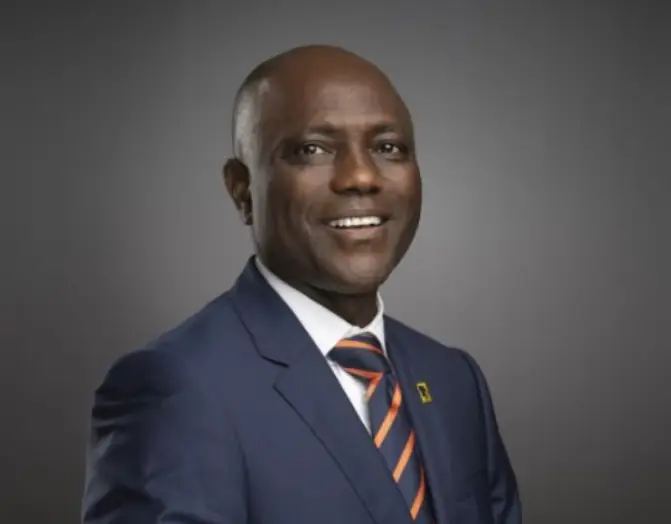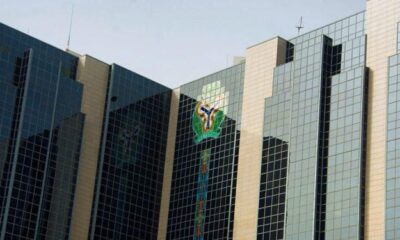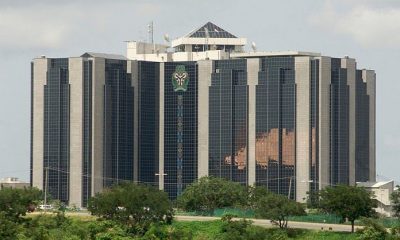Business
CBN Raises Capital Base For Mega Banks To N500bn
Published
4 weeks agoon
By
Editor
Barely 48 hours after restating the need to increase the capital base of Deposit Money Banks for improved productivity, the Central Bank of Nigeria has announced new guidelines on its recapitalisation policy for banks in the country.
The new guidelines were disclosed in a statement signed by its Acting Director, Corporate Communications, Sidi Ali, in Abuja on Thursday.
She said the apex bank had directed commercial banks with international authorisation to increase their capital base to N500bn and national banks to N200bn.
According to the acting CBN director, commercial banks with national licences must meet a N200bn threshold, while those with regional authorisation are expected to achieve a N50bn capital floor.
Similarly, non-interest banks with national and regional authorisations will need to increase their capital to N20bn and N10bn, respectively.
The CBN’s move came two days after the Monetary Policy Committee hinted that it would change the capital base of the nation’s banks.
At the press briefing that followed the 294th MPC meeting on Tuesday, the CBN Governor, Olayemi Cardoso, urged DMBs to expedite actions to increase their capital base to strengthen the financial system against potential risk.
In its meeting, the committee noted that to guard against risk, commercial banks in the country should accelerate their recapitalisation efforts.
Cardoso said, “The MPC also reviewed developments in the banking system and noted that the industry remains safe, sound, and stable. The committee thus called on the bank to sustain its surveillance and ensure compliance of banks with existing regulatory and macro-potential guidelines.
“The MPC also enjoined the banks to expedite actions on recapitalisation to strengthen the system against potential risks in an increasingly globalised world.”
READ ALSO: FULL LIST: 31 States Owe CBN N340bn Bailout Funds
However, the latest CBN policy directive specifies that commercial banks with international authorisation are now required to shore up their capital base to N500bn.
The current capital base is stratified based on the type of banking licence – banks with regional, national, and international licences are currently expected to maintain the minimum capital bases.
The proposed increase in the capital base comes nearly two decades after the CBN’s 2004 banking reform, which increased the then-prevailing capital base from N2bn to N25bn.
The 2004 banking reform was characterised by massive mergers and acquisition activities, ultimately reducing the number of banks in the country from 89 to 25.
The PUNCH had reportrd last year that Deposit Money Banks’ chief executive officers and other top executives had begun moves to raise fresh capital to bolster their respective institutions’ capital base through preliminary merger and acquisition talks.
Recall that in November 2023, Cardoso, at the 58th Annual Bankers’ Dinner organised by the Chartered Institute of Bankers of Nigeria, announced plans by the apex bank to carry out a fresh round of banking recapitalisation for the Deposit Money Banks.
He said the policy was part of its efforts to strengthen its capacity to support Nigeria’s drive to become a $1tn economy by 2026.
At the dinner, Cardoso said, “Despite the challenging global and local economic environment, Nigeria’s financial sector has demonstrated resilience in 2023 with key indications of financial soundness largely meeting regulatory benchmarks.
“Stress test conducted on the banking industry also indicates its strength under mild to moderate scenario on sustained economic and financial stress. Although there is room for further strengthening and enhancing resilience to shocks.
READ ALSO: JUST IN: CBN Sells Forex To BDCs At N1,251/$1
“Therefore, there is still much to be done in fortifying the industry for future challenges. The economic agenda of President Bola Ahmed Tinubu’s mandate has set an ambitious goal of achieving a GDP of $1tn over the next seven years.
“Attaining this target necessitates sustainable and inclusive economic growth at a significantly higher pace than current levels. It is crucial to evaluate the adequacy of our banking industry to serve the envisioned larger economy.
“It is not just about its current stability. We need to ask ourselves, can Nigerian banks have sufficient capital relative to the finance system needed in servicing a $1tn economy in the near future, in my opinion, the answer is no, unless we take action. As a first test, the central bank will direct banks to increase their capital.”
Earlier in March, a report by Ernst and Young indicated that at least 17 out of the existing 24 Deposit Money Banks might be unable to meet the Central Bank of Nigeria’s capital requirement if it is increased from its current N25bn.
The new report, titled ‘Navigating the Horizon: Charting the Course for Banks amid Plans for Recapitalisation’ noted some banks might depend on different recapitalisation options, which include mergers and acquisitions, initial public offerings, placements and/or right issues and undistributed profit (retained earnings) despite the fact that financial soundness indicators show that Nigerian banks were largely safe and resilient as of 2023.
“On this basis, a worst-case scenario given a 15x capital multiplier for 24 banks will be considered based on the type of banking licenses held. We have benchmarked the current capital of these banks against the current capital requirement and four recapitalization scenarios,” it noted.
In spite of the possible disruption, the apex bank has gone ahead with it’s drastic move.
A circular signed by the Director, Financial Policy and Regulation Department, Mr. Haruna Mustafa, to all commercial, merchant, and non-interest banks and promoters of proposed banks emphasised that all banks were required to meet the minimum capital requirement within 24 months commencing from April 1, 2024, and terminating on March 31, 2026.
To enable them to meet the minimum capital requirements, the CBN urged banks to consider injecting fresh equity capital through private placements, rights issues and/or offers for subscription, Mergers and Acquisitions, and/or upgrade or downgrade of license authorisation.
Furthermore, the circular disclosed that the minimum capital shall comprise paid-up capital and share premium only. It stressed that the new capital requirement shall not be based on the Shareholders’ Fund.
READ ALSO: CBN’S Incomplete Exhibits Stalls Emefiele’s Trial Over Alleged $6m Procurement Fraud
“Additional Tier 1 Capital shall not be eligible for meeting the new requirement. Notwithstanding the capital increase, banks are to ensure strict compliance with the minimum capital adequacy ratio requirement applicable to their license authorisation.
“In line with extant regulations, banks that breach the CAR requirement shall be required to inject fresh capital to regularise their position,” it added.
The CBN circular said the minimum capital requirement for proposed banks shall be paid-up capital, adding that the new minimum capital requirement shall apply to all new applications for banking licenses submitted after April 1, 2024.
It noted that the CBN would continue to process all pending applications for banking licenses for which a capital deposit had been made and/or an Approval-in-Principle had been granted.
However, it said that the promoters of such proposed banks would make up the difference between the capital deposited with the CBN and the new capital requirement no later than March 31, 2026.
In an earlier interview with our correspondent, the Chief Executive Officer of the Centre for the Promotion of Private Enterprise, Dr Muda Yusuf, welcomed the move to increase banks’ capital base, adding that the current capital base was grossly inadequate.
He said, “The minimum capital requirements of the banking industry need to be reviewed in light of the considerable loss of value amid depreciating domestic currency. During the banking consolidation of 2004, the minimum capital requirement for banks was raised from N2bn to N25bn. The revised capital requirement was equivalent to $187m. Today, the same N25bn is the equivalent of just $32.5m.”
Also, Uche Uwaleke, a Professor of Capital Markets at Nasarawa State University, urged the CBN not to coerce banks into increasing their capital base, as was the case during the last recapitalisation drive; rather, they should be incentivised.
“The idea of recapitalisation of banks is a welcome one. Capital is needed to finance big-ticket projects, especially when the government targets a $1tn economy in a few years. But I think the strategy should be somewhat different from the approach adopted in 2005. It should be more about incentives than coercion,” he said.
Meanwhile, the CBN said all banks are required to submit an implementation plan (clearly indicating the chosen option(s) for meeting the new capital requirement and various activities involved with their timelines) no later than April 30, 2024.
PUNCH
You may like


CBN Sells Fresh Dollars To BDCs At N1,021/$


CBN Gives New Directive On Lending In Real Estate


How I Collected Dollars In Cash For Emefiele, Dispatch Rider Tells Court


JUST IN: CBN Sells FX To BDCs At N1,101/$1


JUST IN: CBN Gov Sacks Eight Directors, 32 Others


BREAKING: Jim Obazee Concludes CBN Probe, Submits Report To Tinubu

The Central Bank of Nigeria (CBN) started fresh and direct sales of US dollars at N1,021 per dollar to Bureau De Change operators.
Nigeria’s apex bank disclosed this in a circular signed by its Director of Trade and Exchange Department Hassan Mahmud.
“We write to inform you of the sale of $10,000 by the Central Bank of Nigeria (CBN) to BDCs at the rate of N1,021/$1. The BDCs are in turn to sell to eligible end users at a spread of NOT MORE THAN 1.5 percent above the purchase price,” the circular posted on its website read.
READ ALSO: Tinubu Unveils African Counter-Terrorism Summit
“ALL eligible BDCs are therefore directed to commence payment of the Naira deposit to the underlisted CBN Naira Deposit Account Numbers from today, Monday, April 22, 2024, and submit confirmation of payment, with other necessary documentations, for disbursement of FX at the respective CBN Branches.”
CBN’s move is coming as the naira is recording a slight depreciation against the dollar after weeks of gains.
In late March, the bank also sold $10,000 to each of the eligible Bureau De Change (BDC) operators in the country at the rate of N1,251/$1.
READ ALSO: Mixed Reactions Trail Video Of Couple’s Customised N200 Notes
Like in the most recent sales, it warned BDCs against breaching terms of the dollar sales, vowing to sanction defaulters “including outright suspension from further participation in the sale”.
The fortunes of the naira have fallen sharply since President Bola Tinubu took over in May. Inflation figures have reached new highs and the cost of living hitting the rooftops.
Nigeria’s currency slid to about N1,900/$ some months ago at the parallel market. But in recent weeks, it has gained against the dollar.
The Nigerian authorities have also doubled down on their crackdown against cryptocurrency platform Binance and illegal BDCs.
On March 1, the CBN revoked the licences of 4,173 BDCs over compliance failures.

Olusegun Alebiosu has been appointed as the Acting Managing Director/Chief Executive Officer of First Bank of Nigeria Limited (FirstBank Group), effective April 2024.
Alebiosu steps into this pivotal role from his previous position as the Executive Director, Chief Risk Officer, and Executive Compliance Officer, a position he held since January 2022.
Alebiosu brings to the helm of FirstBank over 28 years of extensive experience in the banking and financial services industry. His expertise spans various domains including credit risk management, financial planning and control, corporate and commercial banking, agriculture financing, oil and gas, transportation, and project financing.
READ ALSO: JUST IN: Access Holdings Names New Acting CEO
Having embarked on his professional journey in 1991 with Oceanic Bank Plc. (now EcoBank Plc.), Alebiosu has held several notable positions in esteemed financial institutions.
Prior to joining FirstBank in 2016, he served as Chief Risk Officer at Coronation Merchant Bank Limited, Chief Credit Risk Officer at the African Development Bank Group, and Group Head of Credit Policy & Deputy Chief Credit Risk Officer at United Bank for Africa Plc.
Alebiosu’s academic credentials further enrich his professional profile. He is an alumnus of the Harvard School of Government and holds a Bachelor’s degree in Industrial Relations and Personnel Management. Additionally, he obtained a Master’s degree in International Law and Diplomacy from the University of Lagos, as well as a Master’s degree in Development Studies from the London School of Economics and Political Science.
READ ALSO: Meet Newly Appointed Union Bank CEO
A distinguished member of various professional bodies, including the Institute of Chartered Accountants (FCA), Nigeria Institute of Management (ANIM), and Chartered Institute of Bankers of Nigeria (CIBN), Alebiosu is renowned for his commitment to excellence and ethical practices in the banking sector.
Beyond his professional endeavors, Alebiosu is known for his passion for golf and adventure. He is happily married and a proud parent.
With Alebiosu’s appointment, FirstBank of Nigeria Limited anticipates continued growth and innovation under his leadership, reinforcing its position as a leading financial institution in Nigeria and beyond.
Business
CBN Gives New Directive On Lending In Real Estate
Published
1 week agoon
April 17, 2024By
Editor
The Central Bank of Nigeria, CBN, has released a new regulatory directive to enhance lending to the real sector of the Nigerian economy.
The directive, issued on April 17, 2024, with reference number BSD/DIR/PUB/LAB/017/005 and signed by the Acting Director of Banking Supervision, Adetona Adedeji, signifies a notable shift in the bank’s policy towards a more contractionary approach.
In line with the new measures, the CBN has reduced the loan-to-deposit ratio by 15 percentage points, down to 50 per cent.
This move aligns with the CBN’s current monetary tightening policies and reflects the increase in the Cash Reserve ratio rate for banks.
READ ALSO: JUST IN: CBN Gov Sacks Eight Directors, 32 Others
The LDR is a metric used to evaluate a bank’s liquidity by comparing its total loans to its total deposits over the same period, expressed as a percentage.
An excessively high ratio may indicate insufficient liquidity to meet unexpected fund requirements.
All Deposit Money Banks are now mandated to adhere to this revised LDR.
The CBN has stated that average daily figures will be utilised to gauge compliance with this directive.
Furthermore, while DMBs are encouraged to maintain robust risk management practices in their lending activities, the CBN has committed to continuous monitoring of adherence and will adjust the LDR as necessary based on market developments.
READ ALSO: JUST IN: CBN Increases Interest Rate To 24.75%
Adedeji has called on all banks to acknowledge these modifications and adjust their operations accordingly. He emphasised that this regulatory adjustment is anticipated to significantly influence the banking sector and the wider Nigerian economy.
The circular read in part, “Following a shift in the Bank’s policy stance towards a more contractionary approach, it is crucial to revise the loan-to-deposit ratio policy to conform with the CBN’s ongoing monetary tightening.
“Consequently, the CBN has decided to decrease the LDR by 15 percentage points to 50 per cent, proportionate to the rise in the CRR rate for banks.
“All DMBs must maintain this level, and it is advised that average daily figures will still be applied for compliance assessment.
“While DMBs are urged to sustain strong risk management practices concerning their lending operations, the CBN will persist in monitoring compliance, reviewing market developments, and making necessary adjustments to the LDR. Please be guided accordingly.”

Three Suspected Pipeline Vandals Caught In Edo
Cultists Arrested For Invading Anambra Hotel With Charms

LASTMA, Viju Officials Clash Leaves 10 Injured
Trending

 Entertainment4 days ago
Entertainment4 days agoBridesmaids’ Dance At Wedding Causes Stir On Social Media [VIDEO/PHOTOS]

 Metro4 days ago
Metro4 days agoVIDEO: ‘UNN Lecturer’ Caught Pants Down With Married Student

 News2 days ago
News2 days agoDrama! Supporters Of Yahaya Bello Perform Rituals to Prevent His Arrest By EFCC [Video]

 Headline3 days ago
Headline3 days agoDrama As Women Fight Dirty, Breasts Fall Out During Spring Break Outing In US [PHOTOS/VIDEO]

 News3 days ago
News3 days agoVIDEO: Force PRO Orders Arrest Officers Caught On Video Bashing Driver’s Car

 Entertainment3 days ago
Entertainment3 days agoNollywood Actor, Zulu Adigwe Is Dead

 Headline3 days ago
Headline3 days agoMeet 17-year-old Nigerian Who Won $3.5m Worth Of Scholarships From Harvard, 13 Other Foreign Universities

 Metro3 days ago
Metro3 days agoEdo Cultists Kill Rival In Daughter’s Presence, Abandon Getaway Car

 News5 days ago
News5 days agoIGP, Jonathan Disagree Over State Police

 Headline3 days ago
Headline3 days agoVideo Of Girl Being Bullied, Slapped At Lead British School Sparks Outrage Online [PHOTOS/VIDEO]
































